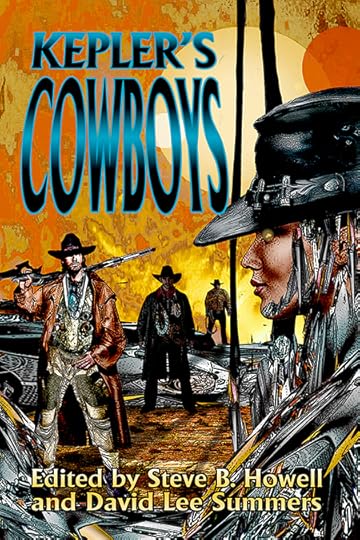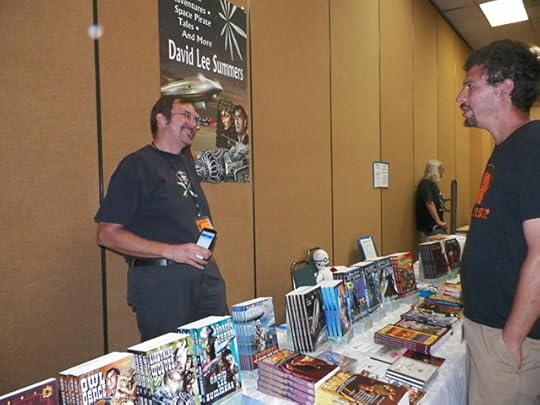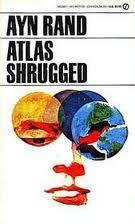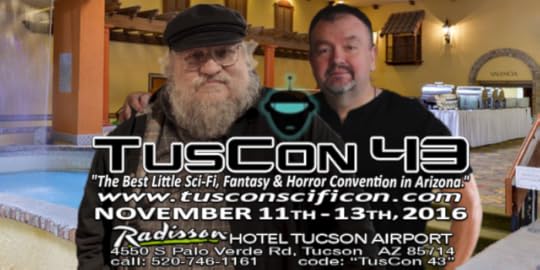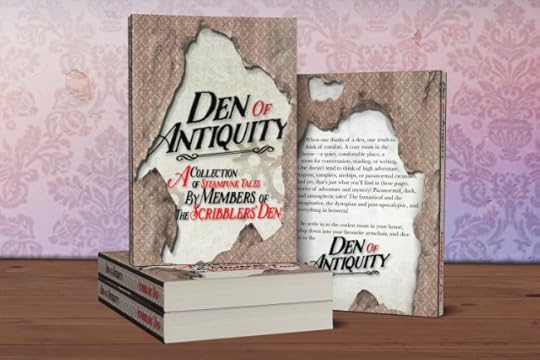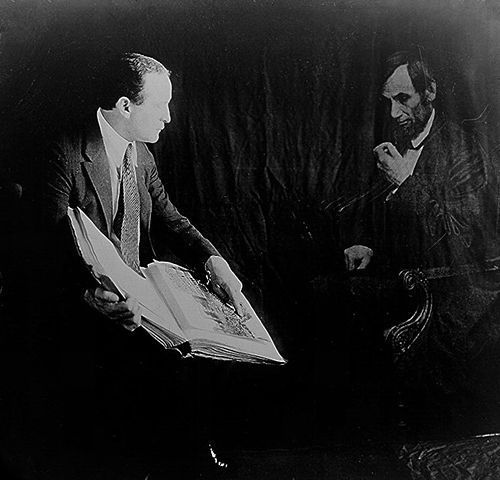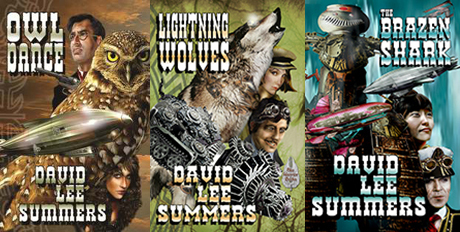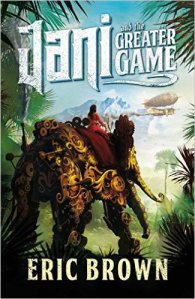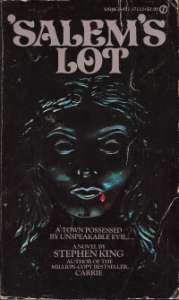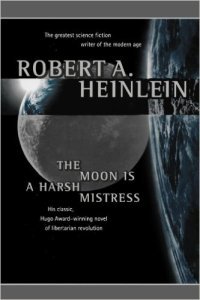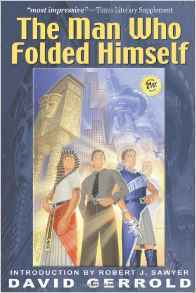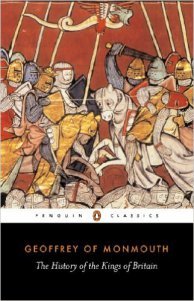David Lee Summers's Blog, page 94
November 21, 2016
Kepler’s Cowboys Cover Reveal
I have nearly finished selecting and editing stories and poems for Hadrosaur Productions’ new anthology, Kepler’s Cowboys. I hope to have the process wrapped up this week. In this anthology, the authors imagine the daring men, women, and even machines who will travel to the stars, explore, and settle planets discovered by the Kepler Space Telescope. My co-editor on the project is Steve Howell, who is also project scientist for NASA’s K2 mission, which is the extended Kepler Space Telescope mission. Recently, artist Laura Givens turned in her cover for the book.
Physicist Stephen Hawking has been in the news recently saying he believes humans only have about 1000 years left on Earth due to factors such as climate change, nuclear terrorism, and even the rise of artificial intelligence. Like Hawking, I believe humans need to move out into space in order to survive as a species. That said, there’s a part of me that worries his 1000-year estimate is optimistic.
Results from the Kepler Space Telescope suggest that almost every star we see has a planetary system around it. Earth-based telescopes and the recent K2 mission have been finding planets ever closer to Earth, many of which are in their stars’ habitable zones, meaning that liquid water can exist if all other conditions are right. This gives me hope that future generations can, indeed, push out into the stars and find new homes for humanity.
Kepler’s Cowboys follows our anthology A Kepler’s Dozen which presented tales of thirteen words discovered by the Kepler Space Telescope. In the first anthology, we invited authors to participate and worked with them closely as they developed their stories. The new anthology has much more of a “wild west” feel, not only in the stories themselves, but in the sense that we opened it up to anyone who wanted to submit to tell whatever story they desired. We did this because there are, in fact, so many worlds out there that the number of possible futures is endless.
Even though we have allowed authors to submit whatever stories they wanted, Steve and I have still worked closely with the authors to make sure they present worlds that are within the realms of possibility as we know them. In fact, this has been part of the process I’ve enjoyed most. It’s been an aspect of editing that I missed in the last days before the Tales of the Talisman hiatus. I spent so much time reading and selecting stories, then creating issues of the magazine, that I never really had a chance to help authors with their story craft. I hope Kepler’s Cowboys captures some of the excitement that comes seeing what authors present when allowed to explore a theme and tell the stories they want, but also maintains a high level of quality and consistently good storytelling throughout.
I hope to announce a formal publication date for Kepler’s Cowboys soon, but we’re currently shooting for publication in February or March 2017. In the meantime, if you haven’t already, be sure to check out A Kepler’s Dozen.


November 19, 2016
Don Quixote
This past week, I finished one of the novels that’s been on my to-read list for a long time: Don Quixote by Miguel de Cervantes. 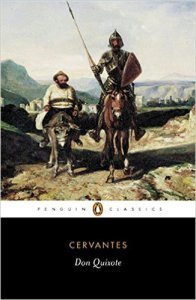 For those not familiar with the plot, Don Quixote tells the story of Alonso Quixano, a huge fan of tales about knights errant. He decides to cosplay a knight errant and convinces his tenant Sancho Panza to cosplay his squire and the two sally forth only to discover that no one has invented comic cons much less any other safe space to cosplay in seventeenth century Spain.
For those not familiar with the plot, Don Quixote tells the story of Alonso Quixano, a huge fan of tales about knights errant. He decides to cosplay a knight errant and convinces his tenant Sancho Panza to cosplay his squire and the two sally forth only to discover that no one has invented comic cons much less any other safe space to cosplay in seventeenth century Spain.
Two things prompted me to pick up Don Quixote when I did. First of all, I learned that we just passed the novel’s 400th anniversary and I felt this was a milestone that should be celebrated. What’s more, Don Quixote is very much a novel of a man reaching his 50s, facing mortality, and asking if he’s made everything he could of his life. As someone who has just reached his 50s, it seemed apropos.
For the most part, this novel, which is contemporary with Shakespeare’s plays, holds up remarkably well. Much or the humor still works, though occasionally it seems a little too cruel for my taste. I read the Penguin Classics translation by John Rutherford, which I found very readable.
The novel’s thematic arc reminds me a bit of the “Tooter Turtle” cartoons of the 1960s in which Mr. Wizard would send the titular turtle to another time and place to try on a new, more exciting life only to discover he wasn’t cut out for it after all and beg to come home. I have to admit, those cartoons always annoyed me a bit. Even as a kid, I recognized that one of the great things about life was the opportunity to experience new things and to challenge oneself. Yeah, sometimes things don’t work out so well, but other times you succeed splendidly.
Fortunately, Cervantes’s presentation is more nuanced than a Tooter Turtle cartoon. Cervantes himself was a veteran of the Battle of Lepanto (which, by the way, appears in my novel Vampires of the Scarlet Order). Afterwards, Cervantes was captured by pirates and sold as a slave. He finally returned to Spain five years later when he was ransomed by his parents. He tried his hand at writing plays and though they were produced, received little notice. He also worked as a tax collector and was jailed multiple times for irregularities in his accounts. Cervantes knew what it was to try and fail, then try again. The upshot is that Don Quixote is more cautionary about going into situations with open eyes and being careful about being overly nostalgic about the past.
A figure I’ve seen repeated quite a bit lately is that there are 4500 new books being published every day. In that environment, being a writer can feel like a quixotic exercise in its own right. However, even Don Quixote found an audience in the duke and duchess who took him in for a time. I hope you’ll take a moment to browse my selection of books and perhaps bring one home to entertain you for a few nights.


November 14, 2016
On Turning 50
Over the weekend, while at TusCon in Tucson, Arizona, I celebrated my fiftieth birthday. It’s one of those points in life where I find myself looking back to see where I’ve been as well as looking forward to see where I’m going.
In my first fifty years, I’ve written and published nine novels, eighty-four short stories, and fifty-four poems. I’ve edited three anthologies, plus two magazines for ten years each. I contributed to the commissioning of the WIYN 3.5-meter telescope and the NMSU 1-meter telescope. I’m co-discoverer of two variable stars and I helped take data that contributed to the discovery of dark energy. Most of all, I’m proud to be the father of two incredible young ladies, one in high school, the other in college, who have a wide range of talents in such areas as computer science and mathematics.
Looking ahead, my tenth novel, The Astronomer’s Crypt, is nearing release. I have two anthologies in the publication queue: Kepler’s Cowboys and Maximum Velocity: The Best of the Full-Throttle Space Tales. I have four short stories accepted and awaiting publication. Beyond that, I’m in the early phases of writing a new novel and I have a “fix-up” novel a little over half completed. Plus I have story treatments for four more novels. Presuming no major funding shifts, I expect to be involved in commissioning two new instruments at Kitt Peak in the coming years.
As I reach fifty, I’m arguably in the best health I ever have been. The arthritis that plagued me for years is in remission and I regularly take long walks through my neighborhood. Nevertheless, one specter looms over me. My dad was only fifty-two when he died suddenly of a heart attack. In the plus column, my doctor is helping me watch my heart health and both of my brothers have now outlived my dad by over a decade. I have no immediate reason to fear for my imminent demise. Nevertheless, I find myself grieving for how truly short my dad’s life was cut and watching my health has taken on a new urgency.
In short, as I turn fifty, I feel proud of what I’ve accomplished. My regrets are minimal. While there are some harsh words and rash actions I’d take back if I could and some friends I’ve lost touch with over the years, it’s hard to say I’d have a better life if I’d taken a different path. I have several exciting things to look forward to in the coming months and years, plus plans and goals for the years beyond that.
Thanks to my readers for sharing some of this fifty-year journey with me. I look forward to sharing the coming years with you as well.


November 12, 2016
Funding Science
This weekend finds me at TusCon in Tucson, Arizona where I’m speaking on panel discussions and giving a reading from my forthcoming novel, The Astronomer’s Crypt. I’m glad to spend time with friends and have a little breath of fresh air after news of this week’s bitter and divisive election.
As I’ve stated in an earlier post, I hesitate to spend a lot of time on political subjects in this blog, but it’s been hard to escape political topics this week. That said, I thought I’d share one of the most interesting articles I read in the run-up to the election, partly because it hits close to my “day” job operating telescopes at Kitt Peak National Observatory. This was Scientific American’s article grading the presidential candidates on science.
Unless something radical and unprecedented happens in the electoral college, we now know Donald Trump will be our next president. He received Scientific American’s lowest grade on science. I won’t give a blow by blow of everything he says in the article. I’ll leave you to read it if you’re interested, but I will take a quick look at two topics near and dear to me: Space and STEM education.
On the subject of Space, Trump is quoted as saying, “Space exploration has given so much to America, including tremendous pride in our scientific and engineering prowess. A strong space program will encourage our children to seek STEM educational outcomes and will bring millions of jobs and trillions of dollars in investment to this country.” He goes on to say, “Observation from space and exploring beyond our own space neighborhood should be priorities.” On the surface, I have no real problem with this.
The potential problem comes when Trump speaks further about priorities. As reported about a year ago in the Washington Post, when asked about space, Trump said: “Right now, we have bigger problems—you understand that? We’ve got to fix our potholes. You know, we don’t exactly have a lot of money.” I think fixing potholes on Interstates—where it seems most federal money for this sort of thing would go—is an important thing, but it’s hard to imagine that it would cost so much as to leave little left over for science.
On the subject of STEM education, Trump says, “There are a host of STEM programs already in existence. What the federal government should do is to make sure that educational opportunities are available for everyone. This means we must allow market influences to bring better, higher quality educational circumstances to more children.” He then goes on to say, “The management of our public education institutions should be done at the state and local level, not at the Department of Education. Until more choices are provided in our cities, those who tout their concern about educational outcomes cannot be taken seriously.” It’s pretty clear from this that Trump believes the federal government should not provide more funding for STEM education. The problem here is that not all state and local governments have access to the kinds of corporate funding he imagines coming in to educate kids. What’s more, not all talented kids come from those places that might benefit from such corporate funding.
With these things in mind, I’d like to leave you with some food for thought from Ayn Rand’s Atlas Shrugged. During John Galt’s speech at the end of the novel, she writes: “You proclaim yourself unable to harness the forces of inanimate matter, yet propose to harness the minds of men who are able to achieve the feats you cannot equal. You proclaim that you cannot survive without us, yet propose to dictate the terms of our survival, asserting your right to rule us by force—and expect that we, who are not afraid of that physical nature which fills you with terror, will cower at the sight of any lout who has talked you into voting him a chance to command us.”
There’s no doubt, science and science education are important to the national interest. What’s more, scientists and science educators deserve to be fairly compensated and adequately funded. It’s not clear a Trump administration will prioritize spending on space or STEM education, which leaves it to the rest of us.
For my part, I’ve given talks at schools along with science fiction and comic conventions—work by the way, which is funded through sales of my books, not the federal government. I’ve encouraged the education of my daughters in all aspects of math, science, and technology. I’m also a member of The Planetary Society which has been doing great work at providing much-needed support for space science. I encourage you to get involved with STEM programs in your area, helping out where you can or even just attending public programs when they’re offered. If those aren’t available, there are exciting citizen science projects offered through Zooniverse.org.


November 7, 2016
TusCon 43
This coming weekend, I’ll be at TusCon, an annual science fiction convention held in Tucson, Arizona from November 11-13 at the Radison Hotel at the Tucson Airport. The writer guest of honor is George R.R. Martin, author of A Song of Ice and Fire, which HBO has adapted in to A Game of Thrones. The artist guest of honor is Peri Charlifu, an award winning artist from Colorado with over 30 years experience in the field. The event is already SOLD OUT and I am told there will be no tickets at the door.
My schedule at TusCon is as follows:
Friday, November 11
6:00pm – 7:00pm. New hotel, same ol TusCon. Panel Room 1 (Valencia). In this panel, we discuss what’s new and what’s the same at TusCon. We even have a recycled Guest of Honor, although chances are only the panelists know that. On the panel with me: Curt Stubbs, Wendy Trakes, Scott Glener, Earl W. Parrish
7:00pm – 9:00pm. Meet the Guests. Ballroom (Seville). Come rub elbows with the convention guests, enjoy the cash bar, be regaled by Toast Master Ed Bryant.
10:00pm – 11:00pm. Discovering New Worlds. Panel Room 2 (Palo Verde). The Kepler Space Telescope along with many ground based surveys have literally found thousands of planets around other stars. What kinds of worlds are we finding and how do we find them?
Midnight – 1:00am. The Astronomer’s Crypt. Panel Room 1 (Valencia). I read from my latest horror novel inspired by my work at Kitt Peak National Observatory. In the novel, astronomers, ghosts, drug cartels and monsters from the beginning of time collide at an observatory on a dark and stormy night.
Saturday, November 12
10:00am – 11:00am. Is serialization making writers forget how to write a good, solid, stand alone story? Panel Room 1 (Valencia). Now that everything successful must get a sequel how much time should be devoted to planting the seeds for the series? How much does that impede telling a satisfying single story? On the panel with me are Janie Franz, Jeffe Kennedy, and Van Aaron Hughes.
11:00am – Noon. Autograph Session. Autographs (Upper Terrace). I’ll be autographing my wares alongside such notable folks as Dr. David Williams, Geoff Notkin, and Thomas Watson.
1:00pm – 2:00pm. The physics of sci-fi space battles. Panel Room 1 (Valencia). Most of sci-fi is filled with space battles between giant carriers, or fighters buzzing every which way, firing lasers and missiles at each other. In reality, space battles will be determined almost completely by orbital dynamics. There is little room for surprise attacks, little opportunity to change trajectory once they’ve begun, and their outcomes are probably easy to forecast well in advance. This will change how war is waged in space, and even hard science fiction authors often fail to address these changes. It might be fun to watch a few classic battles, readdress them with physics, figure out the differences, and see what probably should have been different. On the panel with me are Gautham Narayan and David A. Williams.
9:00pm – 10:00pm. Pitch Perfect – You can get published now! Ballroom (Seville). Bob Nelson of Brick Cave Media, Janie Franz of Museit Up Media, and I will take one-minute pitches for projects we’re editing. In my case, I have a spot reserved in the anthology Kepler’s Cowboys. Can you earn one of the last spots in the book. Come along and give it a try, but be sure you read the guidelines first!
Sunday, November 13
Noon – 1:00pm. Is conflict overrated? In the age of the antihero, maybe we just need more stories about nice people doing nice things. Ballroom (Seville). Remember when protagonists were… well… protagonists? Why have we left those days behind? On the panel with me are Jill Knowles, Thomas Watson, Earl W. Parrish, and Van Aaron Hughes.
In addition to all these great panels, Hadrosaur Productions will be in the dealer’s room. What’s more, book dealer Marty Massoglia and I will both be celebrating milestone birthdays over the weekend. There will be a celebration at some point. If you’re at TusCon, track us down for details! Hope you have your tickets and we’ll see you there!


November 5, 2016
Den of Antiquity
Today is the release day for an exciting new anthology I’m proud to be part of called Den of Antiquity. This anthology was dreamed up by members of an online writing community I belong to called The Scribbler’s Den, which is part of The Steampunk Empire. The project was curated and edited by the group under the direction of Scribbler’s Den member, Bryce Raffle. Volunteer members peer reviewed the stories and other volunteers proofread the book. I’m writing this just as I finished reading the book in a breathless rush and I have to say, I think it turned out well. It was a lot of fun to see the worlds dreamed up by my fellow steampunk writers and people I’ve come to think of as an online family over the last year and half.
Here’s the blurb from the back of the book:
When one thinks of a den, one tends to think of comfort. A cozy room in the house—a quiet, comfortable place, a room for conversation, reading, or writing. One doesn’t tend to think of high adventure, dragons, vampires, airships, or paranormal creatures. And yet, that’s just what you’ll find in these pages. Stories of adventure and mystery! Paranormal, dark, and atmospheric tales! The fantastical and the imaginative, the dystopian and post-apocalyptic, and everything in between! So settle in to the coziest room in your house, plop down into your favourite armchair, and dive in to the Den of Antiquity.
Featuring stories by Jack Tyler, E.C. Jarvis, Kate Philbrick, Neale Green, Bryce Raffle, N.O.A. Rawle, David Lee Summers, William J. Jackson, Steve Moore, Karen J. Carlisle, B.A. Sinclair and Alice E. Keyes.
My story in the anthology is a brand new Clockwork Legion story. Someone has taken one of Professor Maravilla’s mechanical jackalope harvesters and turned it to evil purposes, robbing banks. Can Marshall Larissa Seaton stop the machine before it absconds with all the gold in the New Mexico Territory? Be sure to read Den of Antiquity to find out! What’s more you’ll get a lot of other great stories as well.
I loved the fact that this anthology spanned the world, had protagonists of many different social classes, and really showed the diversity that makes steampunk a wonderful world to play in as a writer. Not only were there vampires, dragons, and airships, but paranormal investigators, dinosaurs, superheroes and gods. Some stories depicted worlds I’d enjoy living in, others not so much, but I general enjoyed making the acquaintance of the characters inhabiting those worlds and whether you’re an ardent steampunk or new the genre, I bet you’ll agree.
Proceeds from this anthology will be donated to help disaster relief, because even though we’re writing about the most comfortable room in the home, we recognize that people going through a disaster no longer have comforts.
You can order Den of Antiquity at the following online bookstores:
Amazon
Barnes and Noble
Kobo
iBooks


October 31, 2016
Remembering Houdini
Happy Halloween! I hope everyone dropping by will have a safe and enjoyable celebration. This Halloween finds me operating the Mayall 4-meter telescope instead of trick-or-treating, but I do plan to bring some spooky reading with me to the telescope to celebrate the occasion.
Today also marks the ninetieth anniversary of Harry Houdini’s death. Houdini fascinated me as a kid and the more I’ve learned about him over the years, the more he intrigues me. Not only was he an amazing escape artist and magician, but he was a pioneer in both cinema and aviation. However, what has always fascinated me most was Houdini’s work as a skeptic. The photo below shows Houdini in a “spirit” photograph of him interacting with Abraham Lincoln through the magic of a double exposure.
Houdini became interested in the occult and spiritualism after his mother died in 1913. He wanted to contact his mother beyond the grave. However, back in his early days as a performer, he masqueraded as a spiritual medium himself and began to recognize that the mediums he contacted had just updated and recycled tricks he himself once used. Ashamed of his own past, he started a crusade to expose fake mediums and show people how they performed their tricks.
By 1925, Houdini’s show went from his familiar routine of escapes and magic tricks to showing how psychics and spiritualists performed their tricks. Houdini chronicled his exploits in a book entitled A Magician Among the Spirits which he co-authored with C.M. Eddy Jr. Reportedly, it’s this book which cost Houdini his friendship with Sir Arthur Conan Doyle, the author of Sherlock Holmes.
Doyle himself was a strong believer in spiritualism, though interestingly he’s associated with his own share of intellectual fraud. Probably the most famous case was helping to publicize the Cottingly Fairies. In this case, two young cousins photographed themselves with dancing pixies. However, the cousins later confessed that the “fairies” were illustrations from a popular children’s book of the day called Princess Mary’s Gift Book. I first read about this case in James Randi’s book Flim Flam. Of course, Randi himself was influenced to investigate the paranormal by Houdini. I was honored to meet the Amazing Randi when I was in college, where he did his own demonstration of psychic “magic.”
In 1926, Houdini planned to start a new book about religious miracles with C.M. Eddy Jr. and none other than H.P. Lovecraft. Although an outline and three chapters were written, plans for the book were derailed by Houdini’s untimely death later that year.
Despite Houdini’s efforts to debunk the paranormal, his widow Bess went on to attempt to contact her dead husband through the aid of spiritualists. It’s said her final attempt happened eighty years ago tonight on October 31, 1936. The séance was broadcast on the radio. The medium, Ed Saint, called out on to Houdini to make himself known, but no answer came. After an hour, Bess called an end to the séance. At that point, a very localized, violent storm broke out. Supposedly it was clear over the surrounding area. It only rained over the séance location.
I hope you stay warm and dry this Halloween and may all your encounters with ghosts and spirits prove pleasant ones.


October 29, 2016
The Magnificent Seven
About a month ago, after a meeting in Tucson, I saw the 2016 remake of The Magnificent Seven starring Denzel Washington, Chris Pratt, and Ethan Hawke. 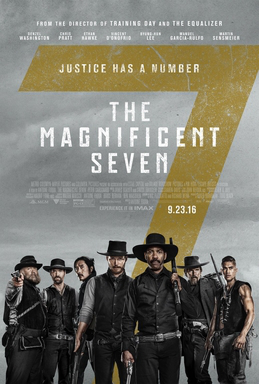 Because I was in Tucson for work, I was on my own, but I was pleasantly surprised when David B. Riley, an editor I’ve had the pleasure of working with on several projects walked in behind me. So, we got to enjoy watching the new version together.
Because I was in Tucson for work, I was on my own, but I was pleasantly surprised when David B. Riley, an editor I’ve had the pleasure of working with on several projects walked in behind me. So, we got to enjoy watching the new version together.
In this version of the movie, a mine has opened near the town of Rose Creek. The mine owner, played by Peter Sarsgaard, wants to drive away the townspeople so he can have the entire valley for his mine. A woman played by Haley Bennett seeks out gunmen who will drive out the mine owner. It’s an interesting variation on the premise of a village terrorized by bandits.
The movie is, of course, the latest remake of Akira Kurosawa’s Seven Samurai. The premise of the 2016 version is a bit different from the others I’ve seen. Overall, the revised premise works. I only had one quibble and that was the mine owner’s implicit statement about America being founded on capitalism. In the 1870s where the film is set, venture capitalism was still a relatively newfangled approach to business. Most businessmen of the day would have been entrepreneurs relying on their own money and not the investments of others.
As for the other remakes, I’ve spoken a bit about the steampunk-flavored, futuristic anime remake, Samurai 7 in an earlier blog post. I was recently reminded of Roger Corman’s low budget science fiction remake called Battle Beyond the Stars, which is interesting because it stars Robert Vaughn, who played in the 1960 Magnificent Seven and featured one of the first soundtracks by James Horner. Sadly the new Magnificent Seven was Horner’s last soundtrack composition before he died in a plane accident.
One of the things that makes Seven Samurai or The Magnificent Seven compelling is the idea of seven very different people coming together to battle insurmountable odds for little or no reward. I especially liked the very diverse group in the latest movie which included an African-American, a Latino, a Native American, and an Asian. As pointed out by director Antoine Fuqua, this not only represents a cross section of America today, but America as it was in the 1800s.
In thinking about The Magnificent Seven, I’ve come to realize how much it and versions of Seven Samurai have influenced my Clockwork Legion series. In retrospect, it’s especially cool that I watched the movie with David Riley, who published the first of my stories featuring Ramon and Fatemeh in his anthology Trails: Intriguing Stories of the Weird West. In the Clockwork Legion series, I bring together seven heroes, more or less: Sheriff Ramon Morales, Healer Fatemeh Karimi, Captain Onofre Cisneros, Professor M.K. Maravilla, Bounty Hunter Larissa Crimson, Rancher Billy McCarty, and Samurai-turned-farmer Masuda Hoshi. They fight against the insurmountable odds of the Russian Empire aided by an intelligence from the stars. In The Brazen Shark, I even include a few direct homages to the original Seven Samurai. It opens when a village is attacked by samurai bandits and several minor characters in the novel are named after the original seven samurai.
Despite a few similarities, I see Seven Samurai and its successors as just one of many inspirations for my series. I hope you’ll saddle up and come along for the ride. You might just discover a few inspirations I didn’t even see!


October 24, 2016
Time Traveling through Books
Susan over at the Dab of Darkness blog tagged me in a post about books and time travel. This seemed like a fun topic near and dear to my heart and a good way to start a new week.
What is your favorite historical setting for a book?
The hard part about this one is that I love history and I usually find something to enjoy in any historical setting I explore. However, I think if I had to pin down one era it would be the Victorian era that’s so near and dear to the steampunk I write. In fact, I’m delighted to have added a signed copy of Gail Carriger’s Changeless to my collection. That said, although I do enjoy a good novel set in Victorian England itself, my favorite books are ones set in other places of the world at the time, including the Wild West such as Cherie Priest’s Clockwork Century novels or India, such as Eric Brown’s Jani and the Greater Game or even the Africa of Jack Tyler’s Beyond the Rails series.
What writers would you like to travel back in time to meet?
There are lots of writers whose work I admire, but two of the writers who most interest me are Robert Louis Stevenson and Lafcadio Hearn. Stevenson and I share share two initials, a birthday, and a love of pirate stories. Hearn was captivated by the stories of the places he immersed himself in from New Orleans to Japan. Not only have their writings inspired me, they both traveled extensively at a time when it was not always easy to do so and I’d love to hear some of the stories they didn’t have a chance to write down.
What books would you travel back in time and give to your younger self?
The books I’d point my younger self to actually existed back then, but I’d kick myself and actually get myself to read them! I would go back and hand myself Stephen King’s ‘Salem’s Lot. I had preconceived notions that I wouldn’t enjoy King’s work because it was horror, but I would have loved his spooky tale of vampires and I would have been captivated by his great use of characters. I could have learned a lot from reading that book which took my many years to figure out on my own—that I’m still figuring out. Discovering King at a younger age would have started that process a lot earlier!
I’d also encourage myself to read Heinlein’s young adult novels. I remember them on the bookstore shelves when I was a kid, but for some reason never took them home. I would have had a blast with them and their sense of adventure.
If I had to pick a contemporary novel to take back in time, it would have to be a steampunk novel. Clementine or Ganymede by Cherie Priest would have been good choices that my younger self would have liked. It might have kickstarted the idea that I could write steampunk earlier than I did. (Although arguably I started pretty early since I sold “The Slayers” in 2001!)
What book would you travel forward in time and give your older self?
I’d give myself a copy of James Cloyd Bowman’s Pecos Bill: The Greatest Cowboy of All Time. That’s the book that started my love of tall tales and strange stories set in the wild west. It’s actually a book I don’t own, but have recently discovered it’s still in print, so I do need to remedy that. It would be fun to go back and see how Bowman’s version of the Pecos Bill story and the wild west inspired me.
What is your favorite futuristic setting for a book?
It depends on what your asking. Would I like to live in that futuristic setting, or do I think a good story is told there? There’s lots of futuristic settings that make a good story, but I wouldn’t want to live in that world! The Star Trek universe is an example of a futuristic setting which both has great stories, including many great novels, and where I’d like to live. The same is true of A. Bertram Chandler’s John Grimes novels. Both give generally optimistic visions of the future while suggesting plenty of adventures and many worlds to explore. I’m also fond of Ray Bradbury’s Mars, where the past meets the future in a kind of rustic setting on an alien world.
What is your favorite book that is set in a different time period (can be historical or futuristic)?
The hard part about this question is that so much of what I read is set in a different time period, it’s hard to pick just one! However, I’m going to pick The Moon is a Harsh Mistress by Robert A. Heinlein. I love its mix of engaging characters, politics, and attempt at examining the hard realities of making a colony on another world. This is one I remember enjoying a great deal and is one of the books that inspired me to sit down at the keyboard and actually try my hand at writing. It has been a long time since I’ve read it and it’s one of the books I’d like to go back to and see how well the book stands up to my memory.
Spoiler Time: Do you ever skip ahead to the end of a book to see what happens?
I used to do this all the time when I was a kid, but I stopped. I’m not exactly sure when that happened. My best guess would be during my college and graduate school days when most of my reading swapped over to comics and graphic novels for a time. In those, a glance at the end can be a major spoiler!
If you had a Time Turner, where would you go and what would you do?
It would be seriously tempting to go back and “fix” painful incidents in my life. For example, I could take some modern textbooks on cardiac care back to doctors who were tending my dad in the 1980s. However, I’ve read enough books cautioning about the dangers of time travel to know how fraught with peril these kinds of well-meaning things can be! Even Hermione Granger was cautioned about interfering with her own time stream.
So, with that in mind, I’d probably use the time turner to give myself some extra time to work on writing at home while I’m also operating telescopes at Kitt Peak. Heck, using the time turner to go back a few hours and get some extra sleep would be pretty amazing.
Favorite book (if you have one) that includes time travel or takes place in multiple time periods.
Of course, the original and classic is The Time Machine by H.G. Wells, but perhaps my favorite is The Man Who Folded Himself by David Gerrold. Instead of avoiding possible time travel paradoxes, Gerrold embraces them and looks at what happens when someone tampers with time, including his own timeline. The book’s open discussion of sexuality kind of freaked me out as a kid raised in a conservative, Christian household, but it also opened my eyes to other lifestyles than the one I was told was “correct.”
What book/series do you wish you could go back and read again for the first time?
I think it would be Patrick O’Brian’s Aubrey/Maturin series. I hate to admit, but I still haven’t read all of them and those I’ve read have been in kind of a haphazard fashion, so I’d love to go back and make a real dedicated reading of the complete series.
Inviting others to play along.
I’m always a little hesitant to tag lots of people in these kinds of posts since I don’t want to make anyone feel obliged to play along. Also, it’s always possible someone was already tagged by someone else and I just missed their post. That said, if you’ve read this post and would like to take a crack at the answers, you’re more than welcome. If you tag me as the guy who inspired you and let me know, I’ll mention you here.
The following people have tagged me back, so go check out their answers!
Jack Tyler at Jack’s Hideout


October 22, 2016
2016 Election Season
First off, a reminder. I’m at Phoenix Fan Fest this weekend. Drop by the Dark Arts Commics booths A625 and A627 to say hi to me and fellow Las Crucen Daniel Thomas.
Politics and government fascinate me. Because of that, I’m watching this year’s election in the United States closely and I definitely plan to participate by voting. Although politics and social issues do tend to appear in my fiction, I don’t write about them much in this blog. The reason has to do with the power of science fiction and fantasy. These genres allow us to step away from our daily experience and look at things afresh through a new lens. I think that new lens is most effective if the reader doesn’t have a preconceived notion of my stance on issues, so don’t worry, I’m not going to try to sell you on one candidate or another here.
A few weeks ago, I was honored to be asked to write a science fictional take on an Arthurian story for a forthcoming anthology called Camelot 13. I love Arthurian legend and delving into some of the oldest versions of the story, such as the version in Geoffrey of Monmouth’s History of the Kings of Britain. Part of my fascination extends to the politics embedded in the legend. In many ways, King Arthur and President Ulysses S. Grant strike me as similar, in that both were arguably great military commanders who had less success as heads of state, in part because they were distracted by the shenanigans of those who surrounded them. This isn’t really the element of the lore I explore in my story, but the science fictional lens lets me look at characters such as Arthur, Mordred, and Guinevere without a lot of the preconceived baggage a lot of readers will bring to those characters. I’m pleased to say the story was accepted and I hope to have more details about the book soon.
Of course, during the political season it’s hard to escape people’s opinions on the candidates or even the process of democracy. One of the most compelling pieces I read was an article the related Discovery Channel host Mike Rowe’s opinions on voting. According to Rowe the only misinformation in the article is that he wrote his words in August and not as a response to the debate. I find myself agreeing with a lot of what Rowe says about the right and responsibility of voting. If you’re an American citizen, I do encourage you to go out and vote, but I ask you to perform your due diligence and research the candidates at all levels and evaluate not just their politics but their competence and whether or not they can do duties they’re being elected to perform.
One interesting thing about living in Southern New Mexico is that I’ve had the opportunity to meet some interesting politicians. As an example, I was once called in to jury duty and found myself questioned by the Doña Ana District Attorney of the day, Susanna Martinez. As it turns out, Martinez is now governor of New Mexico and, at least briefly, was bandied about as potential Vice Presidential material. Whether or not you consider Ms. Martinez a serious choice for that role, this experience reminds me that often times our local politicians are the very people who ultimately become our national politicians. Finding competent people for local offices helps to assure that we find competent people for national offices. This is part of why the research element I mentioned is so important.
One of the hallmarks of the United States is that it is a republic and not a monarchy like that of King Arthur. Presidents, congressmen, supreme court justices have power, but ultimately they answer to us. They’re not our bosses. We’re theirs. I encourage you to act like it and hold them accountable by doing your homework and then voting.



